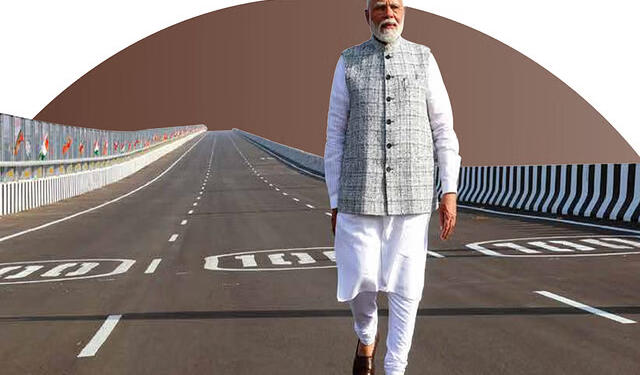Now that the dust of the general elections has settled and the Bharatiya Janata Party (BJP) has fallen short of a full majority in the Lok Sabha, the question arises: will the lack of a majority hinder BJP’s ambitious infrastructure campaign?
The main reason for Prime Minister Narendra Modi’s success in the last two general elections has been visible development, emphasizing not only projects like ‘Bharatmala’ and ‘Sagarmala’ but also Hindutva-inspired nationalism and well-organized welfare schemes. However, with recent political shifts and the clear absence of a majority, questions are being raised about BJP’s ability to maintain the momentum of its infrastructure agenda.
Coalition challenges
Initially, in a scenario where the influence of several parties is significant, conflicting interests and different agendas may dominate BJP’s infrastructure campaign. PM Modi has already been accused of favoring major infrastructure projects in certain western states, especially Gujarat, such as the Bullet Train project.
Under the constraints of coalition compulsions, navigating all major infrastructure projects will require balancing regional and political ambitions. For example, a demand for a significant share in projects like the Vande Bharat Express or ultra-modern expressways may come from regional parties like the JD(U). Ultimately, in states and regions struggling with connectivity and amenities for decades, the coordination of infrastructure projects is crucial and tangible.
Financial challenges
The absence of a majority significantly impacts financial support for infrastructure initiatives. Sufficient funding is imperative for these projects, with the government primarily depending on budget allocations and external investments. Without a clear mandate, securing these resources becomes challenging, potentially stalling crucial infrastructure developments. This underscores the critical role of political stability in ensuring the availability of funds necessary for the nation’s infrastructural growth.
Moreover, the specter of political uncertainty not only dissuades potential investors but also undermines the government’s capacity to procure financial support. Concurrently, there’s a looming pressure on the government to divert funds towards populist policies and welfare initiatives in order to placate public opinion. This delicate balance between fiscal responsibility and populist appeasement further complicates the task of ensuring adequate funding for crucial infrastructure projects.
Pressure of populist policies
Consider the politics of freebies, which has now become an integral part of Indian democracy, even in Andhra Pradesh. The TDP’s ‘Super Six’ manifesto promises welfare initiatives like monthly stipends for unemployed youth and annual seed capital of ₹20,000 for every farmer.
States facing financial constraints will strive to secure adequate funding while also seeking assistance from the central government to sustain their voter support. This dual endeavor involves not only ensuring their fair share of financial allocations but also relying on central assistance to implement welfare schemes and development projects that resonate with their constituents, thereby maintaining political legitimacy and electoral viability.
Legislative deadlock possibilities
Moreover, the lack of a majority can exacerbate legislative gridlock, hindering the passage of crucial reforms such as land acquisition laws. An example is the delay faced by the MVDA government in land acquisition for the Bullet Train project.
Passing amendments to land laws and other legislative changes related to infrastructure without sufficient support in parliament can be even more challenging. After issuing ordinances thrice in August 2015 for amendments to the land acquisition law, the NDA government abandoned efforts to amend the land acquisition law.
Future direction
In the corridors of power, which were once traversed with certainty, the murmur of uncertainty is now echoing. All this will depend on who controls the major infrastructure ministries, including railways, roads, and ports, whether it flourishes or disappears into ambiguity.
BJP’s ability to navigate political alliances will ultimately determine the fate of its infrastructure agenda, whether it flourishes or fades into obscurity.

























